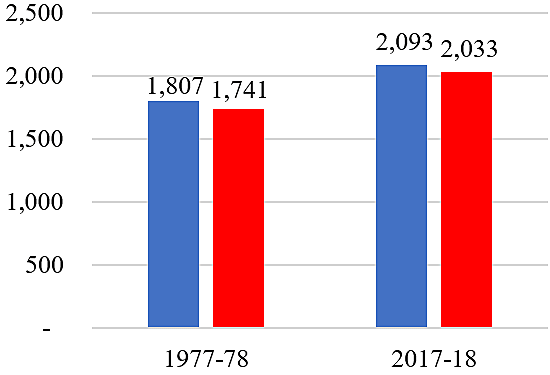Congress is scheduled to reauthorize the Farm Bill this year, the largest part of which is the $127 billion Supplemental Nutrition Assistance Program (SNAP). The SNAP, or food stamp, program is run by the U.S. Department of Agriculture (USDA). It was created in 1964 to improve nutrition for low‐income families, but the economic situation and food consumption of such families has greatly changed since then.
Cato’s John Early and colleagues have described how real levels of poverty in America have plunged over the decades. One change has been food consumption. Chart 1 shows that calories have risen substantially for Americans since the 1970s, including low‐income Americans. The USDA data is the average daily intake for age two and above, and low income means individuals with incomes of less than 186 percent of the poverty level.
Today, many Americans at all income levels are eating too much food, including too much unhealthy food, and they are gaining excess weight. The main food‐related health problem for low‐income Americans today is obesity, not hunger.
Chart 2 shows that low‐income adults and children have higher obesity rates than other Americans. SNAP was originally aimed at alleviating food shortfalls, but many low‐income individuals today are eating too much of the wrong foods. In the CDC data for the chart, adults are age twenty and over and children are age two to 19. Low income means individuals with incomes of less than 130 percent of the poverty level.
There are many unresolved issues in low‐income nutrition. Why do SNAP recipients have less healthy diets than others? Which foods cause obesity? Are “food deserts” an important problem? How can people be encouraged to eat better?
Complex nutrition problems likely won’t be solved by one‐size‐fits‐all solutions from Washington. Indeed, federal interventions are often flawed, and because they are imposed nationally can generate widespread harm. The imposition of arguably faulty federal dietary guidelines is an example.
Another example is SNAP, which has also had broad—and perhaps partly negative—effects on diets. The USDA says that the program is supposed to provide “nutrition benefits,” “healthy food,” and “healthy eating patterns.” But about 23 percent of SNAP benefits are for junk food including sugary drinks, desserts, salty snacks, candy, and sugar.
The N in SNAP is for nutrition, but studies have found the opposite. One USDA study found that “lower nutritional quality of household food acquisitions was associated with SNAP participation status.” A recent review by Jerold Mande and Grace Flaherty found, “Children participating in SNAP were more likely to have elevated disease risk and consume more sugar‐sweetened beverages (SSBs), more high‐fat dairy, and more processed meats than income‐eligible nonparticipants.” The USDA has found that SNAP recipients are more obese than similar‐income nonrecipients.
Because SNAP is a rigid top‐down program, it has likely displaced alternative, and perhaps better, solutions for low‐income nutrition. The federal government, for example, has repeatedly denied city and state requests to withdraw SNAP subsidies from soft drinks and candy, as discussed by Nicole Negowetti. The nutrition case against sugary soft drinks is clear‐cut as Negowetti notes, but they are the single largest purchase item in SNAP. The USDA advises against sugary drinks, but its own SNAP program subsidizes them.
People can buy foods they want with their own money. But when taxpayers are paying $127 billion a year for a program that does not produce the outcomes promised, it is time to reevaluate. Congress should perform a thorough review of SNAP’s nutrition failures as it reconsiders the Farm Bill this year.
I recommend that Congress devolve SNAP funding and administration to the states, allowing for a diversity of policy approaches. Low‐income nutrition involves many uncertainties, so imposing a single national policy does not make sense. With devolution, states could try different rules for allowable purchases, work requirements, benefit levels, and other program features. That approach would generate information about what works best for recipients, taxpayers, nutrition, and the economy.
More on SNAP, nutrition, and obesity here, here, here, here, and here.
Data Note: Obesity for adults means a BMI of 30 or more. Thus, an average‐height man of 5’ 9” is obese if he weighs more than 203 pounds. Obesity is a higher weight category than overweight, which is BMI 25 to 30.
















